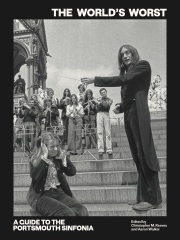What a teeming, joyful tribute to the Portsmouth Sinfonia this is. The World's Worst is a paean to art school experimentalism, to the creative value of amateurism and accidents, to the idea that conceptualism can also be anarchic and funny. ——
Sukhdev Sandhu, director of the Colloquium for Unpopular Culture, New York University
The Portsmouth Sinfonia's sincere efforts to play the classics (on instruments chosen without the benefit of performer schooling) yielded nothing less than an as-yet-unsurpassed, unbridled joy for audience and musician alike. These key texts offer insight into the group dynamics and social and cultural relevance of the project.... ——
Hannah B Higgins, author of
The Grid Book
Our contemporary political leaders appear to be rank amateurs, but the Portsmouth Sinfonia’s story proves that challenges to professionalism (the good kind) have been around for several decades. With every passing year, the ensemble feels further ahead of its time—not only in its solicitation of trained and untrained musicians or its fluent facility with the cultivated and the vernacular, but also in the visionary path it found for a post-Cagean music that went through art school in its post-conceptual phase. This incredible collection brings together historical documents—liner notes, programmes, flyers, letters—with the invaluable remembrances of several members of the Sinfonia. It should serve as a guiding inspiration for every future shambolic disaster born of love. ——
Benjamin Piekut, author of
Henry Cow: The World Is a Problem
At a moment when a large portion of the UK—if not the world—seems hellbent on cutting out its heart to spite its face, it is crucial to return to histories like the Portsmouth Sinfonia. The historical accounts and remembrances herein are full of contradictions, pleasures, jokes and awkward moments between performers and audiences that always steer toward inclusion and veer from cynicism and pessimism. Reading this account of experimental collective endeavors and alternative forms of education has a decidedly populist bent. It reminds that populism wasn’t always petty racists and narcissistic crooks. At one time populism could be the ridiculously beautiful social responsibility of trying, no matter how imperfectly or full of folly, to reach that final note together with passion. ——
Anthony Elms, Daniel and Brett Sundheim Chief Curator, Institute of Contemporary Art / University of Pennsylvania
Portsmouth Sinfonia was slipped surreptitiously into my teenage ears by Brian Eno on the warped X-mas song, "Put a Straw Under Baby," from his Taking Tiger Mountain (By Strategy). Their way of being off was right on enough to inspire lifelong devotion, but I often wondered: to what? Now there's a sourcebook with more detail than anyone ever expected answering that question and much more. The ramshackle texture, the historical context, the sense of humor, the egalitarianism, all the ways in which their world was one of radical potential—The World's Worst presents the Sinfonia in all its lumpy glory. ——
John Corbett, author of
Pick Up the Pieces: Excursions in Seventies Music
The World's Worst wisely avoids...single-string interpretations. A marvellously polyphonic and fittingly dissonant tribute... —Abi Bliss,
The Wire
The Worlds Worst...though long overdue, has arrived just in time. —Justin Moore,
sothismedias.com
[T]he Portsmouth Sinfonia orchestra approached classical music as a new adventure....This book conveys this new adventure in its highest form. —Tosh Berman,
Artbook
[The] World's Worst is a spirited collection of documentary ephemera, archival photographs, and liner notes that captures [the] Sinfonia's unlikely legacy as a soundtrack for a populist avant-garde. —Eileen Cartter,
Ursula Magazine
[A]ccounts of their performances through the 1970s read like lists of superlatives — albeit more in the key of the title of this engrossing history of the Portsmouth Sinfonia. —Michael Andor Brodeur,
The Washington Post
My only instructions were to write a 1000-1500-words review of this book that I am still reeling over as a revelation. —Craig J. Saper,
Hyperrhiz
